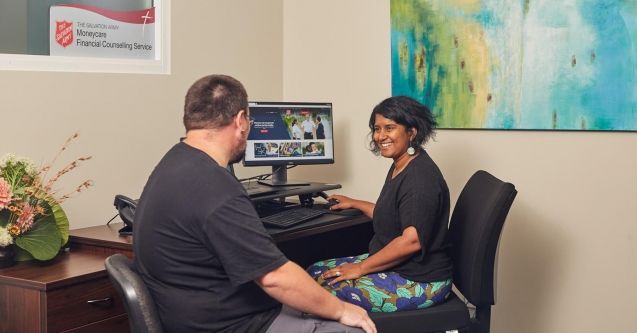Gift in Wills helped Peter stay on top of his money
1 July 2021

COVID-19 has increased, more than ever before, the financial pressures many households were already under.
Business closures and city-wide lockdowns, combined with the uncertainty around how long this will last, is causing a great deal of anxiety and stress for many, and leaving them wondering how they will make it through.
With the tottering Australian economy, The Salvation Army is experiencing exponentially increased numbers of people seeking help – many for the first time. And because generous people like you made the decision to leave a gift in their Will to The Salvation Army, we are able to offer much-needed assistance. One of The Salvation Army’s Moneycare financial counselling services in NSW was saved from closure, thanks to the gift from a family estate, and is now able to provide crucial assistance to those in need.
“They target the vulnerable … those who are already poor and marginalised, and once people get one ‘payday loan,’ they often get caught in this terrible debt spiral.”
Danielle Whyte, Salvation Army Moneycare financial counsellor goes on to say that it is essential that in these challenging times, struggling Australians resist ‘payday’ and other quick loans, as they can often lead to a crippling debt spiral.
“People we see are not getting these loans for things like holidays, but for the very basics such as paying a power bill, fixing an older car or paying rego.”
Danielle says these loans are very easy to apply for and get approved for, but the implications can last for a very long time. Once a person takes out a loan, they are often bombarded with extra offers of money, which is very tempting to those who are most vulnerable in the community.
“So, if things are tight and you have no other options, it can be quite easy to give in.”
Payday loan horror – Peter’s* story
First referred to Danielle’s team six months ago by the local Salvation Army Doorways** caseworker, Peter was drowning under several payday and other quick loan repayment obligations.
Coming from a background of generational disadvantage, Peter was on a part-disability pension due to a range of health issues. Peter’s partner was also on a disability pension and recently hospitalised.
As a result of COVID-19 closures, Peter lost the few hours of weekly work he had driving a shuttle bus for a club. He also had, what Danielle describes as “a dodgy car loan, through a dodgy car dealership”.
“The main concern for me was he just kept getting these [payday] loans and I couldn’t understand how he was getting [them]. I couldn’t walk away from the glaringly poor ‘responsible lending’ practices.”
Thanks to kind-hearted people like you who have left a gift in their Will to The Salvation Army, Danielle – and other Moneycare financial counsellors – are able to offer free services to those who need it most. Where possible, the financial counsellors also advocate with lenders. Importantly, they guide people they are working with to take charge of their finances and, in many cases, avoid bankruptcy.
Road to financial recovery
With significant effort and, at times, industry backlash, Danielle was able to get interest waived on several of Peter’s loans and negotiated repayment options with others. Funding from the gift in Will further enabled Moneycare to continue to counsel Peter and save him from bankruptcy.
Moneycare, and the wider financial counselling sector, are actively lobbying government to get poor and misleading payday lending practices better regulated. To date, they have not seen any significant response.
For those like Peter, who are caught in a downward debt spiral, the sense of fear and helplessness can be overwhelming.
“It’s really sad and what it does is put people who are already in poverty into a state of absolute hopelessness,” says Danielle.
While she continues to work with Peter, his creditors and his Salvation Army Doorways case manager, Danielle says there is no easy fix.
“The thing that always pops up with these loans is they’re easy to get – easier to get than welfare. Usually people who apply have exhausted all other resources, but the reality is that it is often a deep trap, and that easy fix can soon become a deep, deep hole of debt that only magnifies existing problems.”
Your gifts help people maintain control of finances in tough times
In these testing times, it’s good to remember that there are free services available to help people effectively manage their money. Services like Moneycare assist with negotiating payment plans for utility bills such as electricity, phone and internet, understanding how to apply for government assistance, advocating to mortgage providers and much more.
Along with financial counselling, the Moneycare team also offers ‘Be the Boss’ – a short course designed to be taken over three weeks, ‘Be the Boss’ provides strategies and advice on how to get on top of your money.
In response to the current crisis and people’s varying needs and circumstances, all course modules of ‘Be the Boss’ are now available in any order for those who wish to undertake them.
Being able to better manage one’s savings is a skill that most people would like to improve. And when financial stress hits, this skill can be the difference between sink or swim – getting increasingly stressed or finding ways to get out of financial trouble.
If you are looking for someone you can trust to have an important money conversation with, get in touch here.
To find out how you can make an impact on the lives of people facing financial difficulties, please get in touch with the Wills and Bequests team.